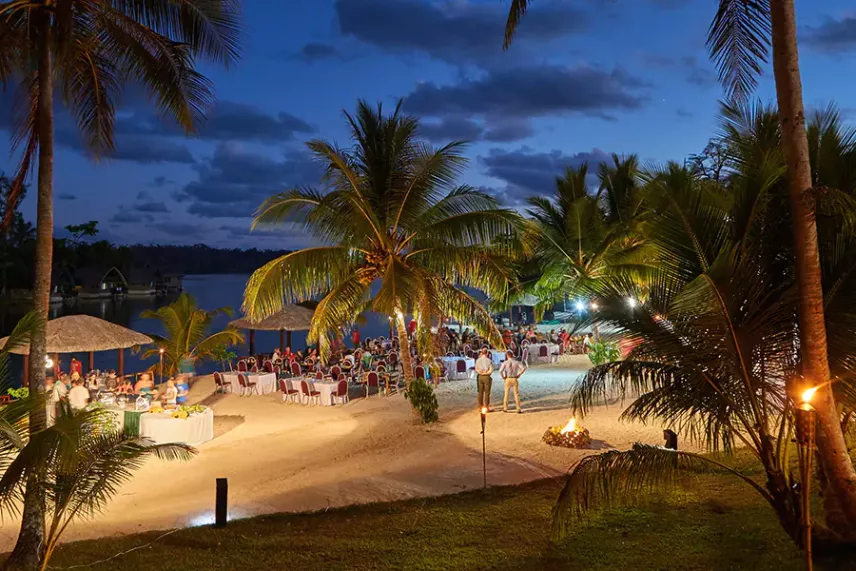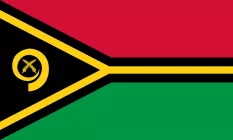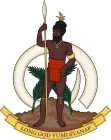Vanuatu

Geographical Location of Vanuatu
Vanuatu consists of twelve large and 70 small islands, of which 65 are inhabited. The islands extend 130 miles from south to north in the southwest Pacific Ocean. All the largest islands are of volcanic origin, while the smaller islands are predominantly coral. All islands have steep hilly terrain inland and a narrow coastal plain. Some islands also have active volcanoes. In the sea areas around the islands there are many coral reefs and several underwater volcanoes. The climate is tropical, hot and humid all year round, with slight seasonal variations. The driest and coldest months are from May to October.
Vanuatu is highly susceptible to earthquakes, volcanic eruptions and tropical storms. The country is also struggling with deforestation, which leads to soil erosion and the loss of arable land. Coral reefs along Vanuatu's coasts, home to the country's marine life, are threatened by harmful fishing practices and soil leaching from human activities. Rapid population growth has also led to environmental problems related to pollution due to poor waste management and inadequate sanitation.
Brief History of Vanuatu
Archaeological finds indicate that there has been human activity on Vanuatu for at least 4,000 years, but little is known about the prehistory of the islands before Europeans came to the area in the 17th century. The first Europeans to discover the islands were Portuguese explorers in 1606. However, the islands were not colonized until the late 18th century, when French and British missionaries settled there. Towards the end of the 19th century, Britain and France joined forces to administer the islands to protect the interests of British and French settlers.
This arrangement was unique in the global context, as the joint British-French colony received two contiguous administrations. Each administration had its own government, police, administrative system, judicial system and schools, responsible only for its own countrymen. As a result, the local population was left stateless, since neither France nor Great Britain were responsible for them. During World War II, the islands became an important Allied base. This contributed to increasing political consciousness among the local population. After the war, opposition to the colonial powers increased, in part because more than a third of the land belonged to foreign interests. The first political parties were formed in the 1970s, and in 1980 Britain and France gave in to demands for independence. Subsequently, the country was characterized by several political crises, discontent and instability.
Society and Politics of Vanuatu
Vanuatu is a parliamentary democratic republic. The president is the head of state and serves a largely ceremonial role. Executive power belongs to the prime minister and the government, while legislative power belongs to parliament. Parliament is elected by general elections for a term of four years and appoints the prime minister and president, as well as the heads of the country's regional councils. On paper, political parties are divided along ideological lines, but in practice politics is characterized by personal struggles for power. Ethnicity and religious affiliation are more important than party loyalty. This led to instability and frequent changes of government.
Vanuatu is made up of many people with different traditions, languages and cultures. Most of the population lives in rural areas, where tribal affiliation is the most important network. In rural areas, old traditions and norms lead to further oppression of women. Violence against women is widespread, and women are underrepresented in politics and other prominent positions in society. Another social problem is related to nutrition. About half the population is overweight, and one in three residents suffers from high blood pressure. Health problems are mainly due to the introduction of new foods and foods such as refined sugar, as well as easy access to fast food.
Economy and Trade of Vanuatu
Vanuatu is one of the least developed countries in the world. Economic development is hampered by slow modernization and poor infrastructure, as well as natural disasters such as tropical storms, volcanic eruptions and earthquakes. Most of the population is employed in agriculture and fishing, which are highly vulnerable to weather and climate change. Agriculture and fishing are largely subsistence, with only a quarter of workers receiving a fixed salary. The most important income for the country is tourism, construction projects and aid. The tourism industry has grown greatly in recent decades, which has also led to the growth of the construction industry.
Vanuatu is struggling with widespread poverty. About 13 percent of the population lives in absolute poverty. The country is completely dependent on imports of fuel, machinery and food, which has led to a large trade deficit. The economic deficit is largely covered by international aid and income from the tourism industry. However, in recent years, the corona pandemic has hit the economy hard as the country is completely dependent on tourism. A shortage of medical equipment also caused problems, but the country received assistance from France, among other things.







